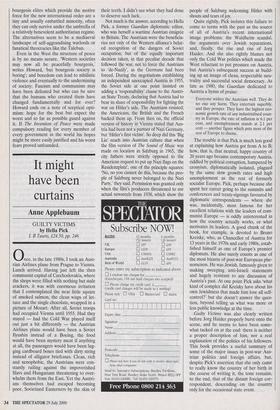It might have been curtains
GUILTY VICTIMS by Hella Pick
I. B Tauris, £24.50, pp. 246 Once, in the late 1980s, I took an Aust- rian Airlines plane from Prague to Vienna. Lunch arrived. Having just left the then communist capital of Czechoslovakia, where the shops were filled with nothing but stale crackers, it was with enormous irritation that I contemplated the neat little square of smoked salmon, the clean wisps of let- tuce and the single chocolate, wrapped in a picture of Mozart. After all, Soviet troops had occupied Vienna until 1955. Had they stayed — had the Cold War played itself out just a bit differently — the Austrian Airlines plane would have been a Soviet Ilyushin instead of a Boeing, the food would have been mystery meat if anything at all, the passengers would have been lug- ging cardboard boxes tied with dirty string instead of alligator briefcases. Clean, rich and xenophobic, the Austrians were con- stantly railing against the impoverished Slays and Hungarians threatening to over- whelm them from the East. Yet the Austri- ans themselves had escaped becoming poor, Sovietised Easterners by the skin of their teeth. I didn't see what they had done to deserve such luck.
Not much is the answer, according to Hella Pick, a former Guardian diplomatic editor, who was herself a wartime Austrian emigree to Britain. The Austrians were the beneficia- ries not only of the Western alliance's belat- ed recognition of the dangers of Soviet occupation, but of the equally important decision taken, in that peculiar decade that followed the war, not to force the Austrians to `de-Nazify', as the Germans had been forced. During the negotiations establishing an independent unoccupied Austria in 1955, the Soviet side at one point insisted on adding a 'responsibility' clause to the Austri- an State Treaty, declaring that Austria had to bear its share of responsibility for fighting the war on Hitler's side. The Austrians resisted; the Americans, the British and the French backed them up. From then on, the official version of history in Vienna stated that Aus- tria had been not a partner of Nazi Germany, but 'Hitler's first victim'. So deep did this 'Big Lie' reach into Austrian culture that when the film version of The Sound of Music was made on location in Salzburg in 1965, 'the city fathers were strictly opposed to the American request to put up Nazi flags on the Residenzplatz', one of the principle squares: `No, no you cannot do this, because the peo- ple of Salzburg never belonged to the Nazi Party,' they said. Permission was granted only when the film's producers threatened to use actual newsreels from 1938, which show the people of Salzburg welcoming Hitler with shouts and tears of joy.
Quite rightly, Pick isolates this failure to come to terms with the past as the source of all of Austria's recent international image problems: the Waldheim scandal, the arguments over Jewish reparations, and, finally, the rise and rise of Jorg Haider. And she also rightly blames not only the Cold War politics which made the West reluctant to put pressure on Austria, but Austria's subsequent success at build- ing up an image of clean, respectable neu- trality and successful social democracy. As late as 1980, the Guardian dedicated to Austria a hymn of praise:
Everyone wishes the Austrians well. They do no one any harm. They entertain superbly, and they prosper. They have the highest eco- nomic growth rate of any industrialised coun- try in Europe, the rate of inflation is 6.1 per cent, and unemployment stands at 2.1 per cent — another figure which puts most of the rest of Europe to shame.
The trouble is that Pick is much less good at explaining how Austria got from A to B; how, that is, that neutral, happy country of 20 years ago became contemporary Austria, riddled by political corruption, hampered by cronyism, diplomatically isolated, plagued by the same slow growth rates and high unemployment as the rest of formerly socialist Europe. Pick, perhaps because she spent her career going to the summits and conferences and treaty-signings favoured by diplomatic correspondents — where she was, incidentally, most famous for her excellent relations with the leaders of com- munist Europe — is oddly uninterested in how the country actually works, or what motivates its leaders. A good chunk of the book, for example, is devoted to Bruno Kreisky, who, as Chancellor of Austria for 13 years in the 1970s and early 1980s, estab- lished himself as one of Europe's premier diplomats. He also surely counts as one of the most bizarre of post-war European phe- nomenon. He was Jewish, famously given to making sweeping anti-Israeli statements and hugely resistant to any discussion of Austria's past. At one point Pick asks 'what kind of complex did Kreisky have about his own Jewishness that made him lose all self- control?' but she doesn't answer the ques- tion, beyond telling us what was more or less public knowledge at the time.
Guilty Victims was also clearly written before Jorg Haider properly burst onto the scene, and he seems to have been some- what tacked on at the end: there is neither a proper description of him, nor a real explanation of the politics of his followers. This book provides a useful summary of some of the major issues in post-war Aus- trian politics and foreign affairs, but, despite Pick's assertion that she only came to really know the country of her birth in the course of writing it, the tone remains, to the end, that of the distant foreign cor- respondent, descending on the country only for the occasional state event.


























































 Previous page
Previous page